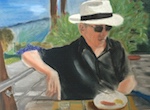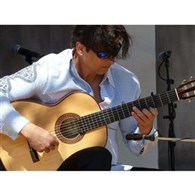Welcome to one of the most active flamenco sites on the Internet. Guests can read most posts but if you want to participate click here to register.
This site is dedicated to the memory of Paco de Lucía, Ron Mitchell, Guy Williams, Linda Elvira, Philip John Lee, Craig Eros, Ben Woods, David Serva and Tom Blackshear who went ahead of us.
We receive 12,200 visitors a month from 200 countries and 1.7 million page impressions a year. To advertise on this site please contact us.
|

|
|
RE: Academic Articles About Flamenco
|
You are logged in as Guest
|
|
Users viewing this topic: none
|
|
Login  | |
|

   
kitarist
Posts: 1715
Joined: Dec. 4 2012

|
 RE: Academic Articles About Flamenco (in reply to BarkellWH) RE: Academic Articles About Flamenco (in reply to BarkellWH)
|
|
|
quote:
ORIGINAL: BarkellWH
Well now, let's review the bidding. To whom is she referring when she speaks of many scholars who have written about flamenco from an outsider's perspective? Most scholars who have written seriously about flamenco have spoken Spanish, have lived in Spain, and have made a serious study of flamenco.
As it is clear from her thesis, of which the intro is a part, outsider refers to a non-Roma. She is quite right about that one. No strawman here.
quote:
ORIGINAL: BarkellWH
Moreover, how does being an "American Roma" qualify her as an authority on the gitanos of Andalucia? I suspect an "American Roma" has few linkages to said gitanos, who have been influenced in very different ways than the American Roma.
No, Roma are quite special in that they mostly keep the essential elements of their culture, customs and way of life (down to specific details), wherever they are. So she is correct to point out that she, as a Roma, would have at least some additional insight non-Roma might not.
quote:
ORIGINAL: BarkellWH
I happen to have Welsh, English, and French heritage, yet my Welsh heritage, in and of itself, hardly qualifies me to expound on the Welsh character. Anymore than an American Black "innately", as she puts it, comprehends the art forms of Togo or the Gambia.
That's a faulty analogy, a logical fallacy, on at least two levels. First, because, as I said above, Roma are quite special in their degree of preserving their culture, customs and way of life regardless of geographical location (it is after all, so much of what their identity is, since they have no home country) - the same is generally not true about descendants of inhabitants of nation-states like the ones you mention. Second, because she is not referring to her DNA (this is what you do), but to an immersive exposure to a living environment and culture.
Lastly, how about you read the thesis, and then post your putdowns - at least it would seem more informed.
|
|
|
|
REPORT THIS POST AS INAPPROPRIATE |
Date Jun. 29 2016 16:15:34
 |
|

   
BarkellWH
Posts: 3458
Joined: Jul. 12 2009
From: Washington, DC

|
 RE: Academic Articles About Flamenco (in reply to kitarist) RE: Academic Articles About Flamenco (in reply to kitarist)
|
|
|
quote:
First, because, as I said above, Romas are quite special in their degree of preserving their culture, customs and way of life regardless of geographical location (it is after all, so much of what their identity is, since they have no home country)
I have lived and worked for years at a time in Bulgaria, Chile and many other countries, and traveled extensively in Greece, as well as other countries. In the three aforementioned countries there are Roma (plural, by the way), and while there may have been some underlying similarities, there were far more pronounced differences. And for the most part, they considered themselves Bulgarians, Chileans, Greeks, etc. as the case may be. I doubt you (or Ms. Cicneros-Kostic) have run across many gitanos in Andalucia who considered themselves without a home country.
You have no idea how much of an immersive exposure to a living environment and culture Ms. Cisneros-Kostic has experienced as a Roma. She appears to be well-educated, and I would surmise she is not very different than any other middle class person with a Master of Fine Arts degree. And I must emphasize again, being an American Roma does not give her any greater insight into the gitanos of Andalucia than any other person who has spent time with them and taken an interest in their culture. You seem to want to essentialize all Roma as having the same characteristics. Worldwide, they are no more susceptible to essentialization than any other cultural group. They may share some traits, but they have very pronounced differences depending on the cultural milleu in which they have lived.
As to your suggestion that I read her thesis before making comments, I would remind you that my comments were all directed at her introduction, which is fair game given how she formulated it. She set up a straw man by referring to non Roma scholars and then proceeded to knock it down by comparing them dismissively to her Roma heritage, her being a dancer, and her being a woman who has lived in Spain. I said she might have something to say in her thesis, but her pompous description of herself as having elevated insights unavailable to others raises a red flag.
Bill
_____________________________
And the end of the fight is a tombstone white,
With the name of the late deceased,
And the epitaph drear, "A fool lies here,
Who tried to hustle the East."
--Rudyard Kipling
|
|
|
|
REPORT THIS POST AS INAPPROPRIATE |
Date Jun. 29 2016 17:14:00
 |
|

   
kitarist
Posts: 1715
Joined: Dec. 4 2012

|
 RE: Academic Articles About Flamenco (in reply to BarkellWH) RE: Academic Articles About Flamenco (in reply to BarkellWH)
|
|
|
quote:
ORIGINAL: BarkellWH
She set up a straw man by referring to non Roma scholars and then proceeded to knock it down by comparing them dismissively to her Roma heritage, her being a dancer, and her being a woman who has lived in Spain. I said she might have something to say in her thesis, but her pompous description of herself as having elevated insights unavailable to others raises a red flag.
Bill
I am glad you are modifying your charge by accepting now that 'outsiders' means non-Roma rather than non-Spaniard - but you forgot to modify your characterization - it is not a strawman anymore, since many flamenco scholars are indeed non-Roma (the strawman would have been to claim something else which is not true, then refute that something else). So, no strawman here. Furthermore, all she did was point out that her thesis has added value by providing additional perspective as a Roma as well as a scholar - BTW her Spanish mother is Roma - she did not put anyone down, she was not dismissive of others, she did not knock them down - these are all your own interpretations in your head - not something she said. It is quite normal to claim that your Masters thesis or PhD dissertation provides some added-value - what would be the point otherwise - and this is all she did - apparently writing in a way, in English as a second language, that was absolutely unforgiving - based on your outsized, sustained reaction to it.
Yes, I would not have written myself in my thesis's intro that it is important - seems a bit weird to do so - but this is all you are really left with from your original objections to her intro, after we broke them down (go back and look). So, yes, point taken. It's a HUGE red flag for you.
|
|
|
|
REPORT THIS POST AS INAPPROPRIATE |
Date Jun. 29 2016 17:32:19
 |
|

   
Kevin
Posts: 294
Joined: Sep. 7 2008

|
 RE: Academic Articles About Flamenco (in reply to edguerin) RE: Academic Articles About Flamenco (in reply to edguerin)
|
|
|
Not only academic articles but dissertations and books as well. Nowhere near exhaustive.
I suggest Bethencourt's study on identity and the toque moderno. He interviewed Amigo, Tomatito, and Nunez and it is one of the more interesting academic articles.
Aoyama, Yuko. 2007. “The Role of Consumption and Globalization in a Cultural Industry: The Case of Flamenco.” Geoforum 38, 103-113.
Banzi, Julia Lynn. 2007. Flamenco Guitar and the Circumscription of Tradition. Phd. Dissertation, Departmernt of Ethnomusicology, University of California, Santa Barbara.
Caballero, Ángel Álvarez. 1994. El Cante Flamenco. Madrid: Alianza Editorial.
——— 2003. El Toque Flamenco. Madrid: Alianza Editorial.
Castro Buendia, Guillermo. 2012. “De Playeras y Seguidillas: La Seguiriya y su Legendario Nacimiento” in Sinfonía Virtual: Revista Gratuita de Musica y Reflexión Musical.
——— 2013. “Jaleos y Soleares: La Differnciación Estilística Entre el Jaleo y la Soleá Como Origen del Estilo Flamenco” in Sinfonía Virtual: Revista Gratuita de Musica y Reflexión Musical.
Charnon-Deutsch, Lou. 2004. The Spanish Gypsy: The History of a European Obsession. University Park, Pennsylvnia: Pennsylvania State University Press.
Cortés, Norberto Torres. 2005. Historia de La Guitarra Flamenca. Editorial Almzara.
Cruces Roldán, Cristina. 2007. El Flamenco y la Musica Andalusí: Argumentos para un Encuentro. Barcelona: Ediciones Carena.
Espín, Miguél and José Manuél Gamboa. 1990. Lus Maravilla: “Por Derecho”. Sevilla: El Adalid Serafico.
Faucher, Alain. n.d. Arte Clásico Flamenco: Ramón Montoya. Paris: France.
Fernández, Lola. 2004. Teoría Musical del Flamenco. Madrid: Acordes Concert.
Gamboa, José Manuél. 2004. Una Historia del Flamenco. Madrid: Espasa.
Gamboa, José Manuél and Norberto Torres. 2007. Flamenco de la A a la Z: Diccionario de Términos del Flamenco. Madrid: Espasa.
Gómez, Juan Vergillos. 1999. Libertad o Tradición: Una Especulación en Torno a la Estetica Flamenca. Nn Cornellá de Llobregat: Aqui+Mas Multimedia.
Granados, Manuél. 2004. Armonía del Flamenco. Barcelona: Casa Beethoven.
——— 2001. Estudio Tecnico de la Guitarra. Barcelona: Ventilador Music.
——— 2006. Manual Didactico de la Guitarra Flamenca. Five Volumes. Barcelona Ventilador.
Guerrero, Gonzalo Rojo. 1992. Juán Breva: Vida y Obra. Málaga: Gráficas San Pacracio.
Hurtado Torres, Antonio and David Hurtado Torres. 2007. La Llave de la Musica Flamenca. Sevilla: Signatura Ediciones.
——— n.d. El Arte de la Escritura Musical Flamenca. Sevilla: Bienal de Arte Flamenco.
Jiménez, José Romero. n.d. La Otra Historia Del Flamenco: La Tradición Semítico Musical, two volumes. Sevilla: Andaluza.
Leblon, Bernard. 2003 (1991). Gypsies and Flamenco: The Emergence of the Art of Flamenco in Andalusia. Trans. By Sinbead Shuinbear. Hatfield: University of Hertforshire Press.
López Cano, Ruben. 2002. “From Rhetoric Musical Figures to Cognitive Types: An Italian Lamento Strolling Along The Streets of Spain.” Paper presented at 9th International Doctoral and Postdoctoral Seminar on Musical Semiotics. University of Helsinki, November 13-17, 2002. Accessed at www.lopezcano.net
Machado y Álvarez, Antonio. 1999. Colleción de Cantes Flamencos. Sevilla: Signatura Ediciones.
Manuel, Peter. 2006. “Flamenco in Focus” in Analytical Studies in World Music ed. Michael Tenzer. New York: Oxford University Press, 92-119.
——— 1986. “Evolution and Structure in Flamenco Harmony” in Current Musicology 42, 46-57.
——— 2002. From Scarlatti to ‘Gunatanamera’:Dual Tonicity in Spanish and Latin American Music” in Journal of American Musicological Society 55/2: 311-336.
Marín, Rafaél. 1902. Método de Guitarra: (Flamenco) por Música y Cifra. Madrid: Don Dionisio Álvarez.
Mitchell, Timothy. 1994. Flamenco Deep Song. New Haven: Yale University Press.
Molina, Ricardo and Antonio Mairena. 1979 (1963). Mundo y Formas del Cante Flamenco. Sevilla: Libreria Al-Andalus.
Pohren, Don E. 1992. Paco de Lucía and Family: The Master Plan. Westport, Connecticut: The Bold Strummer.
——— 2005. The Art of Flamenco. 6th ed. Westport: Bold Strummer.
Quintana, Bertha B. and Lois Gray Floyd. 1972. Qué Gitano: Gypsies of Southern Spain. New York: Holt, Rinehart, and Winston.
Rioja, Eusebio. n.d. Julian Arcas o Los Albores de la Guitarra Flamenca. NP
Rioja, Eusebio and Norberto Torres. n.d. Niño Ricardo: Vida y Obra de Manuél Serrapí Sánchez. Sevilla: Signatura Ediciones.
Roldán, Cristina Cruces. 2003. El Flamenco Y La Musica Andalusí: Argmentos Para Un Encuentro. Barcelona: Ediciones Carena.
Ropero Núñez, Miguel. 1991 /1978. El Léxico Caló en el Lenguaje del Cante Flamenco. Sevilla: Universidad de Sevilla.
Sanlúcar, Manolo. 2005. Sobre La Guitarra Flamenca: Teoría y Sistema Para La Guitarra Flamenca. Cordoba: Ayuntamiento de Córdoba.
Steingress, Gerhard. 1991. Sociología Del Cante Flamenco. Sevilla: Signatura Ediciones.
Torres, Norberto. 2005. Historia de la Guitarra Flamenco: El Surco, El Ritmo, y El Compás. Córdoba: Almuzara.
Washabaugh, William. 1996. Flamenco: Passion, Politics and Popular Culture. Oxford: Berg.
Wheeler, William. 1993. “Practicing Falemcno Guitar in Madrid, Spain: An Event-Centered Study of Accompaniment and Accompanists in Guitar Lessons and Dance Classes.” Ph.d dissertation, Indiana University.
Willems, Wim. 1998. “Ethnicity as a Death Trap: The History of Gypsy Studies.” In Gypsies and Other Itinerant Groups edited by Leo Lucassen, Wim Williams, and Annemarie Cottaar. New York: St. Matin’s Press, 17-34.
Zuazo, Salvador Aleu. 1995. El Chato De La Isla, Entre La Vida Y El Cante. San Fernando (Cádiz, Spain): Ispren.
_____________________________
|
|
|
|
REPORT THIS POST AS INAPPROPRIATE |
Date Jun. 29 2016 21:08:47
 |
|

   
Kevin
Posts: 294
Joined: Sep. 7 2008

|
 RE: Academic Articles About Flamenco (in reply to BarkellWH) RE: Academic Articles About Flamenco (in reply to BarkellWH)
|
|
|
quote:
Quite a line-up, Kevin. It offers plenty of sources on flamenco and gitanos. In fact, it looks like the bibliography of a dissertation.
Haha. You hit the nail on the head.
If I had known that Ethnomusicology was going to take me down so many rabbit-holes, I would have gone into music theory. I didn't want to take post-tonal music because I loathe it. I also thought that they would not allow a thesis on flamenco, so I opted for EM.
Many of the issues discussed on this thread are things I am dealing with. The insider/outsider problem for example. I argue that flamenco emerges in Andalusian culture (and culture is a very problematic term) and that music theory arises in local academic cultures shaped by European history, a dialectical process(in Europe function theory is more common while here in the States, scale-degree theory is more common, although there is a bit of mixture of the two). The mixing of flamenco knowledge and music-analytic knowledge creates a third space in which insider and outsider criteria get blurred. For example, a professional flamenco guitarist who proceeds through the undergraduate equivalent of a theory curriculum, when utilizing academic analytical terms, might totally miss the mark. Likewise, if an academic (outside of Spain) does not immerse himself in the culture, he might be misinterpreting and mistranslating the culture. In fact, translation studies, especially cultural translation, offers some tool to think about these things with.
A case in point: it is easy to look at a score or transcribe a solea which, on the lower strings, spells a II6/4 chord but that utilizes open treble strings. The resulting "chord" would be c-f-a-g-b-e. But, is it really a M9#11 chord? NO! Montoya was not thinking of function or voice-leading and so you can't say "Oh yeah. Montoya was using jazz chords before Paco." Those upper three strings probably facilitate an easier position shift and aren't really functional or a part of the voice-leading (another problematic term).
Same goes for B-A-D-F Bb-G#-D-E. Nowhere in the music of the pillars (Montoya, Ricardo, Sabicas) does this chromatic voice leading occur. The flat five in the bass on the "dominant" chord can be found in Romantic works but not in "Classical." Even there, it is not so common. This is a jazz voicing that began to be used after Paco started experimenting. To note that the second chord is a "chromatic passing chord" and then say that chromatic passing chords (e.g. root position dominants) have always been around is culturally and historically innaccurate.
Of course, what is practical and what are historically causal or conditional are two different matters.
_____________________________
|
|
|
|
REPORT THIS POST AS INAPPROPRIATE |
Date Jun. 29 2016 22:00:54
 |
|

  
Piwin
Posts: 3559
Joined: Feb. 9 2016

|
 RE: Academic Articles About Flamenco (in reply to Kevin) RE: Academic Articles About Flamenco (in reply to Kevin)
|
|
|
Thanks for the recommended read and those very interesting examples.
quote:
This will still be too much woo for some but don't attack the messenger.

To be fair to the postmodernists in respect to Chomsky's quote, at least part of the problem is simply one of language, a problem that also exists in the hard sciences. Scientific speech didn't use to be as far removed from colloquial language than it is today. I was surprised to discover how "easy" it was to read through Einstein's seminal paper on special relativity, compared to anything published in the field of physics nowadays. Steven Pinker has also brought this up in his book "The Sense of Style" and has suggested some possible causes. However, I don't think the fundamental issue with postmodernism is just its verbose character.
Postmodernism has brought some interesting insights. However, the rejection of objective fact coupled with the lack of quantifiable evidence pulled it out of the realm of science altogether. This is what I meant by Chomsky keeping Linguistics out of that rabbit-hole. Though he was not the only one, nor the first, his rigorous use of formal logic and attempts to achieve reproducible results strongly contrasted with a lot of the linguistic pontificating of the time. He understood that there should be no exception to the scientific method no matter what the subject-matter. My impression is that many of the social sciences, once stripped from objectivism, were left with nothing more than intuitive knowledge. One example of a way out of this impasse could be that of Mathematical Sociology, which I perceived to be an attempt to go beyond conclusions that were merely intuitive, build a formal scaffolding that could then be used to obtain reproducible results. You said that scholars in social sciences are now attempting to go beyond disciplinary boundaries to adopt a more holistic approach. I find this quite promising since these other disciplines may be bound by a stricter version of the scientific method than is the case currently in social sciences (as in the example you gave with a neuroscientist). My impression of postmodernism is basically this: some research disciplines were struggling to find a way forward. To get out of this rut, the postmodernists opted out of the scientific method, or added huge exceptions to it that allowed them to keep on theorizing while skipping the whole prediction and observation phases. All the while, it is quite possible that the problem had nothing to do with the scientific method, but had everything to do with how we delineate scientific disciplines. This is what I suspect and that is why I believe the way back into the scientific mold for social sciences will be these kinds of cross-disciplinary projects, coauthored with scholars from different fields. Change the delimitation of the discipline, not the scientific method. Is this making any sense? 
And just to be clear, I'm writing as a complete outsider to the field of social sciences and acknowledge that I'm generalizing on what is(was?) in fact a diverse movement.
_____________________________
"Anything you do can be fixed. What you cannot fix is the perfection of a blank page. What you cannot fix is that pristine, unsullied whiteness of a screen or a page with nothing on it—because there’s nothing there to fix."
|
|
|
|
REPORT THIS POST AS INAPPROPRIATE |
Date Jun. 30 2016 10:34:20
 |
|
 New Messages New Messages |
 No New Messages No New Messages |
 Hot Topic w/ New Messages Hot Topic w/ New Messages |
 Hot Topic w/o New Messages Hot Topic w/o New Messages |
 Locked w/ New Messages Locked w/ New Messages |
 Locked w/o New Messages Locked w/o New Messages |
|
 Post New Thread
Post New Thread
 Reply to Message
Reply to Message
 Post New Poll
Post New Poll
 Submit Vote
Submit Vote
 Delete My Own Post
Delete My Own Post
 Delete My Own Thread
Delete My Own Thread
 Rate Posts
Rate Posts
|
|
|
Forum Software powered by ASP Playground Advanced Edition 2.0.5
Copyright © 2000 - 2003 ASPPlayground.NET |
0.125 secs.
|


 Printable Version
Printable Version











 New Messages
New Messages No New Messages
No New Messages Hot Topic w/ New Messages
Hot Topic w/ New Messages Hot Topic w/o New Messages
Hot Topic w/o New Messages Locked w/ New Messages
Locked w/ New Messages Locked w/o New Messages
Locked w/o New Messages Post New Thread
Post New Thread